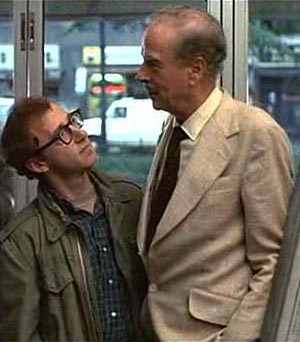Sunday, May 1, 1977
ANNIE HALL. Co-written by Marshall Brickman. No music credit. Co-written and directed by Woody Allen. Running time: 93 minutes. Mature entertainment with no B.C. Classifier’s warning.
THERE IS A SCENE in Annie Hall that concludes with Alvy Singer (Woody Allen) confiding to us that, when he first saw [Walt Disney’s] Snow White, he was attracted to the wicked queen. Then, for the next minute or so, the film turns into an animated cartoon.
We see the queen perched regally upon her throne. And, of course, she has the face of Alvy's girlfriend, Annie Hall (Diane Keaton). The cartoon Alvy is another matter completely.
Diminutive, bespectacled and slackjawed, he looks just like the hero of that new strip in The Province's colour comics section, Inside Woody Allen. The resemblance is more than an interesting coincidence. Indeed, the name of the strip would be an appropriate alternative title for this convulsively funny new film.
Allen is a totally personal comedian. His specialty is the self-put-down. In performance, he wears not only his heart, but his sinuses, glands and cerebrum on his sleeve.
Allen doesn't just identify with life's victims, he claims to be one. Unfortunately, as he becomes ever more successful — Annie Hall is his eleventh film as a screenwriter — his victim credentials have become ever less credible.
In his last few films his ideas have been increasingly strained. Compensating for this was the fact that he was gaining skill as a filmmaker.
With Annie Hall, Allen reaches a significant plateau. His most personal, polished, interesting and entertaining film to date, it is a movie that can be fully enjoyed by those of us who don't really like Woody Allen.
Annie Hall is a memoir, a film that builds its comedy on a serious base. It opens with Alvy, a New York-based comedian whose specialty is the self-put-down, facing the camera with some thoughts on love and life.
Alvy/Allen’s story takes the form of a dramatized monologue. It ranges widely and yet remains firmly centred on a single topic — Alvy's relationships with women — especially one Annie Hall, a would-be singer fresh from middle America.
In broad outline, the story could be Allen's own biography. After all, it is well known that Allen and Diane Keaton, his co-star in three previous films, were once an off-screen couple.
Drawing, apparently, from their experiences, he has created a warm and witty film, one that succeeds completely on its own terms. In it, he shows us a man with a very real problem.
In Alvy Singer's case, the style is the man. Instinctively, the comic knows that his neuroses are his meal ticket. If he changes his outlook, he risks losing his comic vision. Fifteen years of analysis have not resolved his problems, and both he and his analyst are growing rich as a result.
When flaky little Annie meets Alvy, he is already successful. He is a nice, non-frightening nut who teaches her many things, helps her to grow and keeps her entertained along the way.
They love one another for a time. Annie matures and, because she has no stake in Alvy’s eccentric status quo, they grow apart.
Alvy is pleased, then depressed. He tries to win her back and fails. He ends up incorporating their experiences into a stage comedy.
What Woody Allen has done is go a step further. He has produced a movie, one that is both rich in comic invention and startlingly insightful.
A marvellously funny celebration of lost love, Annie Hall offers sentiment, romance and non-stop laughs. A mixture of visual humour, deft one-liners and great gags, her story is a total treat.
The above is a restored version of a Province review by Michael Walsh originally published in 1977. For additional information on this archived material, please visit my FAQ.
Afterword: Although I failed to mention it in the above review — newspapers have only so much space — my favourite scene in the film occurs in the lobby of a Manhattan movie house screening Alvy Singer/Woody Allen’s own favourite film, Max Ophuls’s 1969 documentary The Sorrow and the Pity. Standing in line with Annie, Alvy becomes really annoyed with the man in front of them, who is spouting what Alvy considers nonsense about the works of Italian filmmaker Federico Fellini and Canadian media philosopher Marshall McLuhan. “You don't know anything about Marshall McLuhan!” say pugnacious little Alvy.
“Oh, really?” the unnamed man (Russell Horton) reponds. “Well, it just so happens I teach a class at Columbia called ‘TV, Media and Culture.’ So I think my insights into Mr. McLuhan, well, have a great deal of validity!”
Announcing that “I happen to have Mr. McLuhan right here,” Alvy pulls the professor out from behind a poster frame. McLuhan then delivers the punchline: “I heard what you were saying. You know nothing of my work. . . . How you got to teach a course in anything is totally amazing.”
What we didn’t know at the time was that McLuhan had been flown down to New York to substitute for the more flamboyant Fellini, Allen’s first choice for the man-behind-the-poster part. The Italian had a last-minute schedule conflict, and in July 1976, some weeks after filming had begun, Allen called McLuhan in Toronto, asking him to take the cameo role. According to Phillip Marchard, author of the 1989 biography Marshall McLuhan: The Medium and the Messenger, “Allen’s offer appealed to both the playful side of McLuhan’s character and his need to be taken seriously.” Because McLuhan was enjoying a sabbatical year, there were no scheduling conflicts, and he made the first of his two feature film appearances. The second came a year later, when the professor was credited as the Judge, a voice performance in the 1978 Canadian production, The Third Walker. That job offer came from writer-director Teri McLuhan, who also happened to be his daughter. It was an offer he could hardly refuse.
